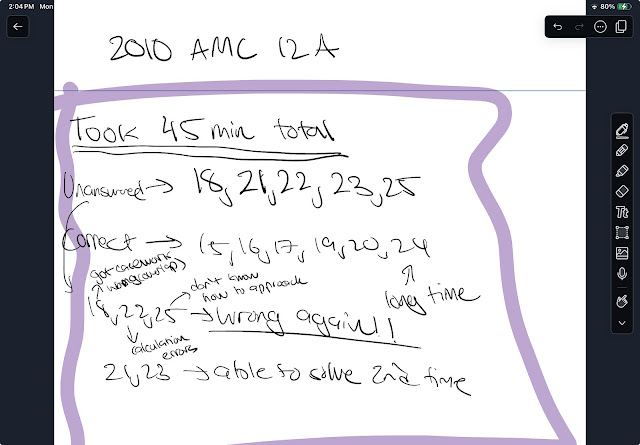6/17/2025 2010 AMC 12A

The best math program for middle school students
2015 Mathcounts National
sprint #22
If six
people randomly sit down at a table with six chairs, and they do not notice
that there are name tags marking assigned seats, what is the probability that
exactly three of them sit in the seat he or she was assigned? Express your
answer as a common fraction.
Try this yourself first (extremely), then scroll down for solutions.
Choose the three people who sit correctly:
\binom{6}{3}=20 .
The remaining three must all sit incorrectly.
A quick check (or listing) shows only two ways: (A\,B\,C) or (A\,C\,B).
Total favourable seatings =20\times2=40; total seatings =6!.
Therefore P=\dfrac{40}{720}=\boxed{\tfrac{1}{18}} .
Pick the three fixed seats: \binom{6}{3}=20 .
Derange the other three: !3 = 2 .
Again 20\times2 = 40 good seatings, so
P \;=\; \frac{20\cdot!3}{6!} \;=\; \boxed{\tfrac{1}{18}} .
Derange the remaining 3 people. The number of derangements of 3 items is D_3 \;=\; 3!\left(1 - \frac{1}{1!} + \frac{1}{2!} - \frac{1}{3!}\right) \;=\; 6\left(1 - 1 + \frac{1}{2} - \frac{1}{6}\right) \;=\; 2.
each week a space
SAT 14 #2 wrong , 15 #2
SAT 16, #5, 6, wrong , 17, 3 and 6
2 weeks later
18, #5 and 5
19 vocab. words 11 - 20
SAT practice test 8, later math don't know what to do
2 weeks later
20, #5, 21, #4
more than a month later
22, #4 and 5 , 23, #4, 6, 8, 12
30, #5, 31, #9
32, #4, 5, 33, 2, 9
local math competition : 21-22 meet 1, # 1, 2, 3 right
34, #4, 35, #6 and 8
21-22 math competition meet 2, #1 and 3 , #2 almost
36 #1,2,3 need to work on harder vocabulary words
37 # 6,9
Math 2021-22 meet 2 # 1 and 3
5/6/25 This week for reading I did Crack Sat tests 38 and 39 and I only gave myself 15 minutes for each test to time myself.
For test 38 the questions I got wrong were 1 and 11 and for test 39 the questions I got wrong were 2 and 5.
Although I felt rushed I was able to complete the test while still comprehending everything so that’s good.
For math this week I realized that I struggled a lot on the algebra 2 part of the (local math competition) tests so I decided that I should learn some of the curriculum.
To learn the course I went on Khan academy and did 2 units of the course and I plan on continuing learning the course to help with (local math competition) problems in the future. Thank you.
2010 Mathcounts
Nationals sprint :
22. Side AB of regular
hexagon ABCDEF is extended past B to point X such that AX = 3AB. Given that
each side of the hexagon is 2 units long, what is the length of segment FX?
Express your answer in simplest radical form.
Try this question first before you scroll down for the solution.
from a 9th grader Ar.
Hello Mrs. Lin, 4/25
This week I reviewed the SAT problems we went over in class. If you could please give me some of those harder SAT problems going forward for homework that would be great. I thought that they were good practice.
I didn’t have a ton of time this week for AMC work, because I have finals for many classes coming up. However, I did do some problems from the 2016 AMC 10 A.
I had some trouble with problems 11, 12 and 9. If we could please go over those that would be great Sorry about the late reflection again.
2025 Mathcounts state sprint
#22: Let n be a positive integer less than
or equal to 1000. If the last two digits of n are reversed, the resulting
integer is exactly 85 percent of n. What is the sum of the possible values of
n?
Try this question first. Then scroll down for solution.
Let n be a positive integer less than or equal to 1000. If the last two digits of n are reversed, the resulting integer is exactly 85 percent of n. What is the sum of the possible values of n?
Let the original number be:
n = 100h + 10t + uThe number formed by swapping the tens and units digits is:
n' = 100h + 10u + tAccording to the problem:
n' = \frac{17}{20}nSo n has to be divisible by 20 (make sure you know why). This implies:
u = 0, \quad t \text{ is even}Let:
t = 2k, \quad 0 \leq k \leq 4Then:
n = 100h + 10t = 100h + 20k n' = 100h + t = 100h + 2kNow compute the difference:
n - n' = 18kAlso, from the given:
n - n' = n - \frac{17}{20}n = \frac{3}{20}nEquating both expressions:
18k = \frac{3}{20}n \Rightarrow n = 120kSince k \neq 0 , we get:
n = 120kValid values for k \in \{1, 2, 3, 4\} , so the numbers are:
120, \quad 240, \quad 360, \quad 480Their sum is:
120 + 240 + 360 + 480 = 120(1 + 2 + 3 + 4) = 120 \times 10 = \boxed{1200}V's record
weekly homework about 30 to 45 minutes
extra videos, links optional
First lesson:
2010 chapter sprint:
Hi, I got a score of 22 and got questions 16, 22, 23, 24,25,27,29, and 30 wrong.
I just guessed these questions because I didn't really find a way to do them.
Second meet:
2011-12 Mathcounts handbook (40 questions total)
Ay
5/7
from a 7th grader A.
2025 chapter test
